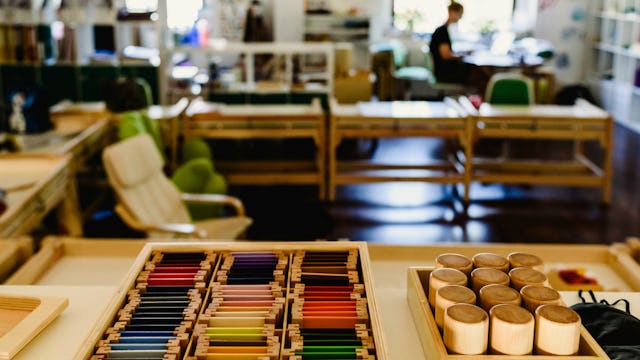What It Really Means To Be A Montessori School

In a world that’s overly eager to push young people into academics, parents are desperate to see a play-based and child-led environment still at work today.
I mean, let our kids be kids, would ya?
Enter: Montessori schools.
But if we look at the guidelines and formalities of the founder, Maria Montessori, and her Montessori ways, can we really be sure all schools claiming to adhere to these principles are actually doing so?
Montessori-focused learning allows young children to act freely while engaging in independent play all at the same time. It is based on the idea that each child learns, develops and interacts with other peers at their own pace and in their own time. Montessori is a safe haven for independence, and it feeds to the scientific observations of a young child’s rapidly growing brain.
Parents are drawn to the freeing and creative nature of Montessori, but Maria Montessori actually found that this method needs order and consistency like anything else. There are certain ways to do everything: how to fold your napkin, how to roll up a rug, how to pour liquid from one pitcher to another, how to draw lines on paper, etc. No child is the same, so materials are arranged in order of difficulty and students may not move onto another activity until they’ve received proper instruction.
Recent research found that children in credible Montessori programs had “significantly greater school-year gains” in executive function, reading, math, vocabulary and social problem-solving compared to their peers in Montessori schools that lacked esteemed accreditation or schools without any Montessori affiliation.
Although it’s been around since the 1900’s, it wasn’t until the ’60’s that we saw a rapid uprising of this educational method. Given the positive reputation of this type of schooling, some daycares and schools are simply slapping the Montessori label on their front door without any type of true affiliation to the core principles.
And because many parents are chomping at the bit for spots in Montessori-oriented schools, it’s no wonder more daycares and schools are motivated to grab the Montessori name to increase enrollment. But just because they “say” they are Montessori, doesn’t mean that they are actually Montessori.
To help stomp out the confusion, experts have given five indicators to be sure your kids are getting what you intended to pay for:
1. Make sure the teachers are properly trained.
Spending time delicately researching the facts is going to pay off in the long run. Teachers should be properly trained for the age group they are teaching by finishing a program accredited by the Montessori Accreditation Council for Teacher Education.
2. Age groups should be mixed.
Montessori classrooms typically consist of children in age groups of three years. (Example birth-3 years, 3-6 years, etc).
3. They should have Montessori materials.
Real objects like pitchers with water, mirrors hung at the child’s height, fabric and wood are all sensory-based and practical materials for day to day life — these should be in their classroom. Think to yourself, what is everything I would need for my day? Is it within their reach? If so, they are focusing on the Montessori way.
4. There should be a mandatory three hours of uninterrupted work time.
Small group and individual direction should be given by teachers while students direct their learning in their own way and at their own pace — alone or with peers.
5. Look at the credentials.
For the majority of “high-fidelity” schools, there should be some sort of verified recognition by, or membership in, an association like the American Montessori Society or the Association Montessori International.
It seems that we are, once again, taking heed to the Montessori method. And even though research has yet to detect exactly what it is about the Montessori approach that reaps benefits and success for so many children, it’s important to look for schools which actually adhere to its methods and principles. These are ways to make sure your kid’s Montessori school is, in fact, a Montessori school.
This article was originally published on